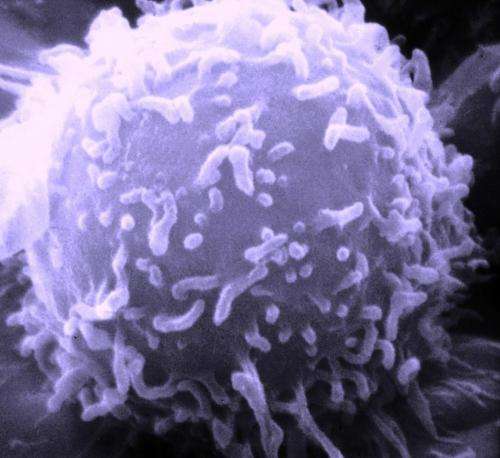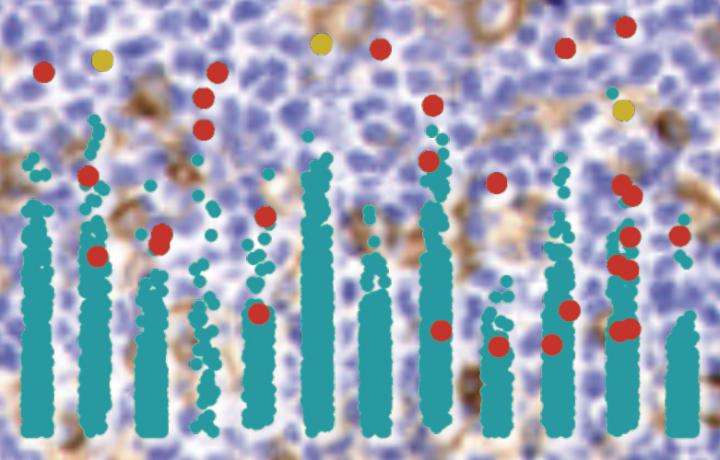May 24, 2016 report
Genetic variants isolated that lead to enhanced PD-L1 protein production in cancer cells

(Medical Xpress)—A large team of researchers from a host of research facilities across Japan has found some genetic variants in some cancer cells that lead to enhanced PD-L1 protein production—which results in increased protection against attacks by the immune system. In their paper published in the journal Nature, the team describes their sequencing study involving adult T-cell leukemia/lymphoma cases, what they found and the possibility that such variants could be used as identifying markers in cancer patients.
Prior studies have shown that an increase in the expression of the protein PD-L1 by cancer cells confers enhanced protection against attacks by the human immune system—PD-1 receptors on T cells bind with PD-L1 causing the immune cells to become unresponsive, preventing them from attacking tumors. In this new effort, the researchers conducted a genetic analysis of a particular type of cancer cell to learn more about the genetic process involved in causing an increase in expression of PD-L1.
The team conducted whole-genome sequencing on samples given by 49 adult patients suffering from leukemia or lymphoma, looking specifically for variations that might account for an increase in expression of PD-L1. In so doing, they found that variations such as duplications, inversions or translocations in 13 of the samples, representing 27 percent of those tested, existed on a certain part of chromosome 9, which prior research had found was the part of the genome responsible for the expression of PD-L1. They report that such alterations seemed to cut off the gene's 3' untranslated region of the protein and in some cases led to rearranging the gene's open reading frame, which allowed more of the protein to be expressed.
Taking the study farther, the team then genetically analyzed more than 10,000 samples from patients with 33 different types of cancers, looking for the same types of variants. They report that they found them in a variety of different types of cancers, including 8 percent of certain types of lymphomas and 2 percent of certain types of stomach cancers.

The team next did some gene editing using CRISPR/Cas9 to disrupt the results of the variation's impact on mouse models and found that doing so prevented the increase in expression of PD-L1, offering more evidence that such increased expressions offers protection of cancer cells from immunity attacks.
More information: Keisuke Kataoka et al. Aberrant PD-L1 expression through 3′-UTR disruption in multiple cancers, Nature (2016). DOI: 10.1038/nature18294
Abstract
Successful treatment of many patients with advanced cancer using antibodies against programmed cell death 1 (PD-1; also known as PDCD1) and its ligand (PD-L1; also known as CD274) has highlighted the critical importance of PD-1/PD-L1-mediated immune escape in cancer development. However, the genetic basis for the immune escape has not been fully elucidated, with the exception of elevated PD-L1 expression by gene amplification and utilization of an ectopic promoter by translocation, as reported in Hodgkin and other B-cell lymphomas, as well as stomach adenocarcinoma. Here we show a unique genetic mechanism of immune escape caused by structural variations (SVs) commonly disrupting the 3′ region of the PD-L1 gene. Widely affecting multiple common human cancer types, including adult T-cell leukaemia/lymphoma (27%), diffuse large B-cell lymphoma (8%), and stomach adenocarcinoma (2%), these SVs invariably lead to a marked elevation of aberrant PD-L1 transcripts that are stabilized by truncation of the 3′-untranslated region (UTR). Disruption of the Pd-l1 3′-UTR in mice enables immune evasion of EG7-OVA tumour cells with elevated Pd-l1 expression in vivo, which is effectively inhibited by Pd-1/Pd-l1 blockade, supporting the role of relevant SVs in clonal selection through immune evasion. Our findings not only unmask a novel regulatory mechanism of PD-L1 expression, but also suggest that PD-L1 3′-UTR disruption could serve as a genetic marker to identify cancers that actively evade anti-tumour immunity through PD-L1 overexpression.
© 2016 Medical Xpress














